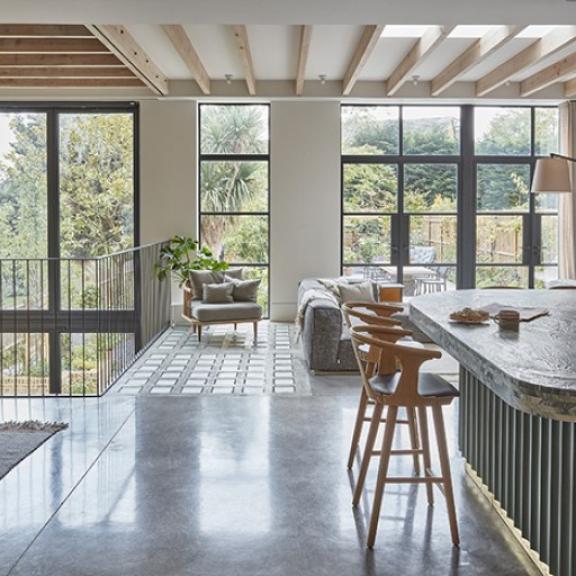BIID Platinum Partner Control4: Health, Wellness, Interiors and Technology
Control4 discusses how technology can support wellness in the home
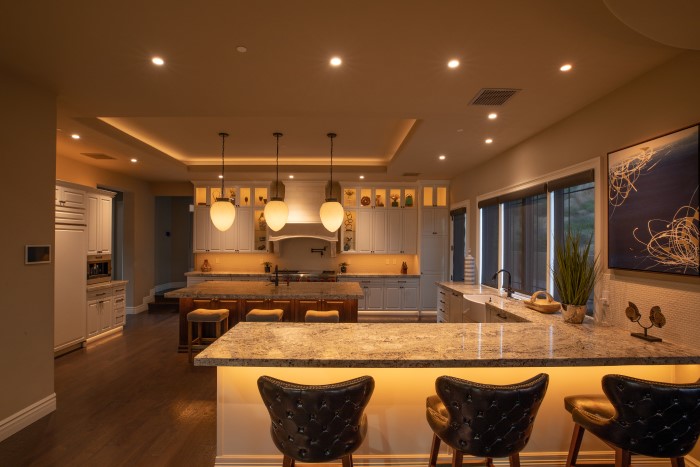
In 2023, health and wellness continued to be top priorities in residential design, according to the American Society of Interior Designers (ASID). ASID’s 2023 Trends Outlook report explores how home design is being impacted by these factors, the growing trend towards holistic healthy living, and interior design that addresses both the mind and body.
BIID Platinum Partner Control4 outlines their thoughts on the role that technology can play in helping interior designers deliver homes that can support health, comfort and wellbeing with help from two Control4 Certified Showroom Partners.
Music
“Post pandemic, our appreciation of wellness has increased more than ever as we’re spending more time at home,” says Abby Fox, Business Development Manager at LC-AV. “We are seeing people building wellness areas, steam rooms, and meditation and yoga rooms; and there’s a great scope for how we as professional technology integrators can contribute throughout the home and into these new spaces as well.”
Damien Smith, Client Director, New Wave AV agrees. “Music is a great example of a technology that can bring incredible health and wellbeing effects and be seamlessly integrated within the interior. It can boost the brain’s production of the hormone, dopamine. Upbeat music can make people feel more optimistic and positive about life. A slower tempo can quieten the mind and relax muscles, making us feel soothed while releasing the stresses of the day.”
“Interior designers can work closely with technology integrators to understand how clients live and to think about where and how they want to listen to music,” adds Abby. “That way, we can make it easily accessible and controllable for their clients in any room in the home, without cluttering up the interior with black boxes, cabling and loudspeakers.”
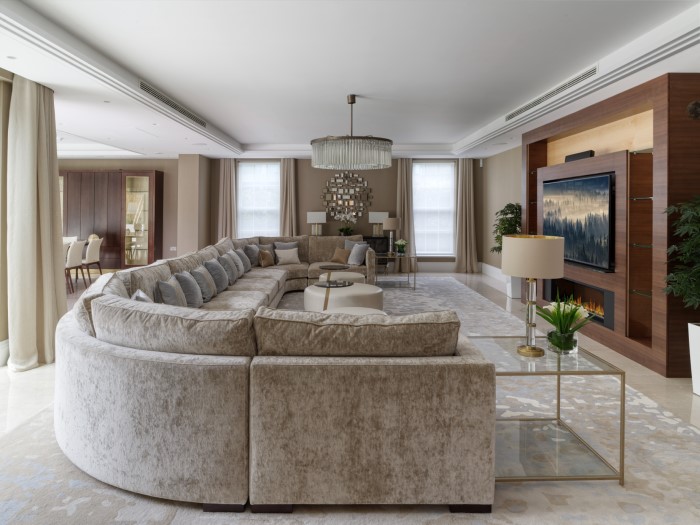
Sleep hygiene
Sleep is another area where technology can make a positive contribution. Since the pandemic, insomnia has increased with almost 23 million people in the UK suffering with sleep issues. The close link between sleep and good health is well established and lighting control technology can help promote better sleep hygiene by tuning into the body’s sleep-wake circadian rhythm. This creates the right environment both to relax and wind down at night and wake up more naturally in the morning.
“As technology specialists, we can make artificial light feel more natural, through controls that allow dimming, creating evening and night-time lighting scenes but also through colour tuneable lighting, introducing cool energising light for the day and moving to warm softer light in the evenings,” says Abby. “Control can also bring multiple technologies to operate seamlessly together, such as lighting and blinds, to build a more holistic scene with bedtime buttons on keypads that can shut the shades, dim the lights, and change the colour temperature to warmer lighting which is more conducive to sleep.”
“Our approach in working with interior designers is very client-centric,” adds Damien. “None of us fall asleep in the same way. The flexibility within today’s available home technologies means that we can tailor sleep hygiene routines for the individual, through combinations of lighting, shading, heating and cooling as well as music. We can create an environment that best supports the client’s health and well-being and automate how this process works for their ultimate comfort and convenience.”
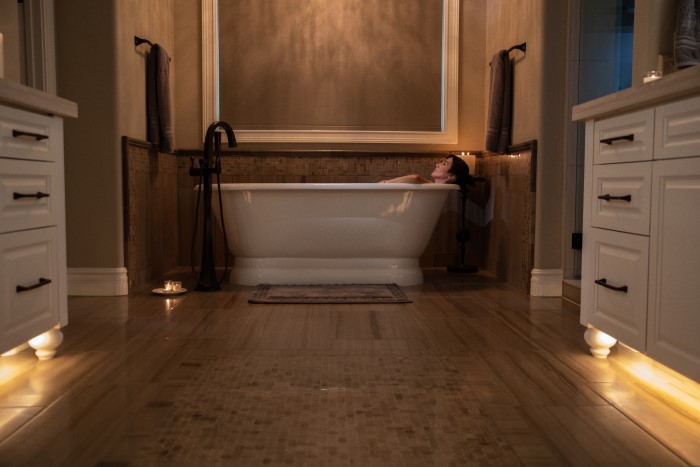
Independent and inclusive living
By 2050, one in four people living in Europe or North America could be over 65 years old. Smart technology installations can help elderly relatives live independently and safely in their own homes, for example, by enabling residents to close doors or adjust lighting with voice control. In addition to voice control, technology can be set up for remote operation to help families stay connected and informed.
“No one wants to make homes feel like ‘big brother’ is watching,” explains Abby. “But we can set up technology for remote monitoring and control to give families peace of mind that they can be connected and supportive of elderly relatives living elsewhere. Technology can also give homeowners the ability to turn everything off with ease and confidence, knowing they can rely on it and remove the anxiety of thinking ‘has everything been turned off?’.
Smart technology also empowers people to create the right environment to suit the personal needs of individual family members. For example, in the UK, it is estimated that around 1 in 7 people are neurodivergent, and 1 in 100 are on the autism spectrum.
“We can create a level of predictability with pre-sets and sequences or by creating a calming environment with tailored and soothing lighting, for neurodivergent people and those on the autism spectrum,” says Damien. “Working with designers, we can help create more peaceful, inclusive and secure homes for everyone in the family.”
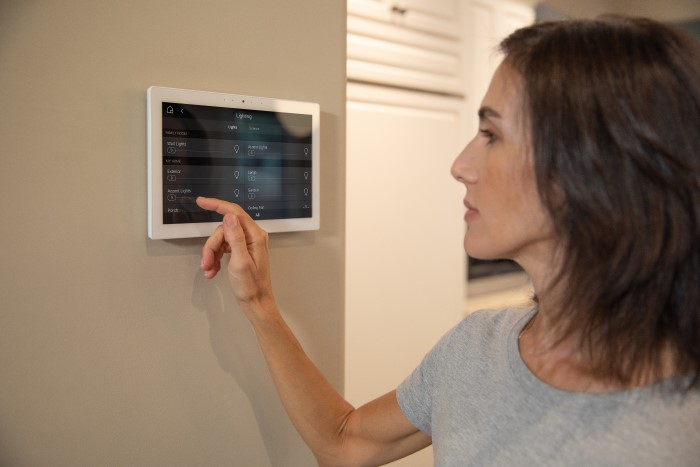
Advice for interior designers
“Technology can bring so many health and wellbeing benefits to clients at the same time as improving the design aesthetic of the interior space,” comments Abby. “However, it must be properly designed around the client and their lifestyle.”
“That’s right,” adds Damien. “We can work closely and empathetically with the interior designer and the client to make sure they have the technology installation that’s right for them. And then, we’re also available afterwards to adjust and tune how everything works to the client’s lifestyle, when they’re actually living with it.”
A new CPD entitled ‘How an Automated Home Can Care for the Family and then Planet’ from Control4 is available for designers. The course explores how smart home technology can improve health and wellness, but also promote a more sustainable home by giving homeowners better control over their energy management and providing more opportunities for them to reduce operational carbon.
For more information and to book a place visit: Control4 | British Institute of Interior Design (biid.org.uk).
Note: Control4 is a BIID Platinum Partner. This article has been produced as part of our sponsored partnership programme.
Explore new resources from the BIID. Seeing a padlock? Just login or become a member to view.
With the launch of the new residential category for this year's awards, get inspired by these award-winning homes
Explore new resources from the BIID. Seeing a padlock? Just login or become a member to view.
BIID has welcomed a range of new members and Industry Partners over the last three months
Explore new resources from the BIID. Seeing a padlock? Just login or become a member to view.
View the highlights from our 60th anniversary party

